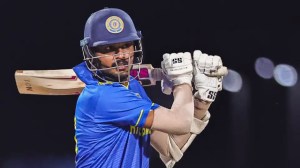US sanctifies Musharraf regime; world follows
WASHINGTON, OCT 18: Indications that the United States has begun to sanctify the new military junta in Pakistan after paying lip service ...

WASHINGTON, OCT 18: Indications that the United States has begun to sanctify the new military junta in Pakistan after paying lip service to democracy and civilian rule is leading to a fervid debate among analysts and policymakers about what message it sends to other Third World democracies.
Statements by several senior Clinton administration officials towards the end of the week gave the impression that Washington is adopting a 8220;a-wink-and-a-nudge8221; approach to the heady, but illegal, developments in Pakistan.
While top officials have made it clear they do not expect Nawaz Sharif to return, other spokesmen have conceded 8212; erroneously, many feel 8212; that the US has no leverage with Pakistan to correct, let alone reverse, the course of events.
The virtual abandonment of its universally acknowledged role as a democracy watchdog, and its rapid acquiescence of the military action, has shocked many analysts. Although Washington has said it wants a return to civilian rule, its calm acceptance of the overturning of an elected, if unpopular, set-up has alarmed those who believe in democratic politics.
8220;Almost unimaginably, some Pentagon officials and other policymakers in the United States are nostalgic for an army leader in Pakistan. They remember the salad days of partnership during the anti-Soviet war in Afghanistan, and leap to the conclusion that Musharraf is like Pakistani generals of old 8212; a man with whom they can do business,8221; Washington Post Managing Editor Steve Coll, who was the paper8217;s New Delhi correspondent at the turn of the decade, wrote on Sunday.
Expectedly, the business-as-usual line was touted by several Cold Warrior types, including former Reagan aide Robert McFarlane, who suggested that Pakistan is an impossible country to govern democratically and military rule is a viable option. The current administration also appears to be shrugging its shoulders and biting that line as evident from the wide-ranging parleys it has initiated with the military dictatorship.
Taking its cue from Washington, countries across the world are holding back on outright condemnation of the events in Pakistan. The European Union today took a much tougher line and set a November 15 deadline for return to civilian rule, but it too appeared to accept the undemocratic deposing of Sharif.
Saudi Arabia, which bankrolled the Sharif regime, also abandoned its protege and appeared ready to deal with the general, as did UAE, which hosted him just a couple of days before the coup.
The US attitude has begun to worry many analysts who question what message this will send to militaries and democracies across the world. 8220;Does that mean that militaries in Peru or Malaysia can overthrow an elected government just because it is unpopular, on the specious promise that they will instal a civilian government when it suits them?8221; one Third World diplomat and a World Banker mused at one gathering.
Old-time subcontinent watchers are particularly horrified that Washington is repeating what New York Times8216; Abe Rosenthal called America8217;s 8220;Himalayan error8221; in the region.
8220;Pakistan8217;s weakness as an American ally, though Washington never seemed to mind, was its leaders8217; refusal to create continuity of democratic governments long enough to convince Pakistanis that the military would not take over again tomorrow. But by showing for years that it did not care much, it the US encouraged Pakistani officers prowling for power, lessened the public8217;s confidence in democratic government when Pakistan happened to have one, and slighted the Indians8217; constancy to democratic elections,8221; Rosenthal, an unabashed Indophile, wrote last week.
The widespread jubilation in Pakistan over the army takeover appears to have influenced not only the policy makers, but also editorialists and commentators. Even respected liberal Pakistani writers like Ayaz Amir and Pervez Hoodboy have supported the overthrow of the Sharif regime, although the prescriptions they suggest from there on is different. Amir wants the army to install an interim civilian government and return to the barracks, while Hoodboy thinks such a government would fail and the military should take full responsibility for the crisis.
Only a few commentators are predicting that the widespread hope that the army will put Pakistan back on the rails could be wrong. 8220;Not only is the army unlikely to save8217; Pakistan, its attempts to assert itself threaten to accelerate a cycle of nuclear risk on the subcontinent,8221; Coll said.
But the predominant mood in Washington appears to be to give the military junta in Pakistan a long rope and plenty of time.
- 01
- 02
- 03
- 04
- 05































